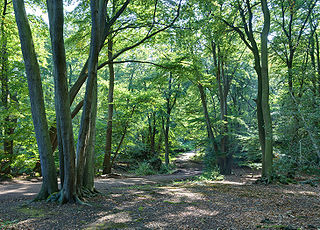
The Common Agricultural Policy (CAP) is the agricultural policy of the European Commission. It implements a system of agricultural subsidies and other programmes. It was introduced in 1962 and has since then undergone several changes to reduce the EEC budget cost and consider rural development in its aims. It has however, been criticised on the grounds of its cost, its environmental, and humanitarian effects.

Community-supported agriculture or cropsharing is a system that connects producers and consumers within the food system closer by allowing the consumer to subscribe to the harvest of a certain farm or group of farms. It is an alternative socioeconomic model of agriculture and food distribution that allows the producer and consumer to share the risks of farming. The model is a subcategory of civic agriculture that has an overarching goal of strengthening a sense of community through local markets.

The Department for Environment, Food and Rural Affairs (DEFRA) is a department of His Majesty's Government in the United Kingdom responsible for environmental protection, food production and standards, agriculture, fisheries and rural communities in the entire United Kingdom. Concordats set out agreed frameworks for co operation, between it and the Scottish Government, Welsh Government and Northern Ireland Executive, which have devolved responsibilities for these matters in their respective nations.
The Countryside Stewardship Scheme was originally an agri-environment scheme run by the United Kingdom Government set up in 1991. In its original form it expired in 2014. It was relaunched for the Rural Development Programme England (RDPE) 2014-2020 with £3.1bn of government subsidy for agriculture and forestry, replacing the previous Environmental Stewardship scheme.
Environmental Stewardship is an agri-environment scheme run by the Department for Environment, Food and Rural Affairs in England which aims to secure widespread environmental benefits. It was formally launched on 18 March 2005, although the first agreements did not start until 1 August 2005.
Natural England is a non-departmental public body in the United Kingdom sponsored by the Department for Environment, Food and Rural Affairs. It is responsible for ensuring that England's natural environment, including its land, flora and fauna, freshwater and marine environments, geology and soils, are protected and improved. It also has a responsibility to help people enjoy, understand and access the natural environment.

The Rural Payments Agency (RPA) is an executive agency of the UK Department for Environment, Food and Rural Affairs (Defra). Prior to Brexit, the RPA delivered the European Union (EU) Common Agricultural Policy (CAP) payments to farmers and traders in England, paying out over £2 billion in subsidies each year. The Agency managing more than 40 schemes, the largest of which the Basic Payment Scheme (BPS) paying more than £1.5 billion to around 105,000 claimants a year.
An environmental management scheme is a mechanism by which landowners and other individuals and bodies responsible for land management can be incentivised to manage their environment.
Benjamin James Goldsmith is an English financier and environmentalist. The son of financier James Goldsmith and Lady Annabel Goldsmith he is founder and CEO of London-listed investment firm Menhaden, which focuses on the theme of energy and resource efficiency.
On 26 June 2003, EU farm ministers adopted a fundamental reform of the Common Agricultural Policy (CAP) and introduced a new Single Payment Scheme for direct subsidy payments to landowners.

The Pesticides Safety Directorate was an agency of the Department for Environment, Food and Rural Affairs (Defra). It was based in York, England, with about 200 scientific, policy and support staff and was responsible for the authorisation of plant protection products and, from 2005, detergents, in the United Kingdom.
The Department of Agriculture, Environment and Rural Affairs (DAERA) is a government department in the Northern Ireland Executive, the devolved administration for Northern Ireland. The minister with overall responsibility for the department is the Minister of Agriculture, Environment and Rural Affairs. The department was called the Department of Agriculture and Rural Development between 1999 and 2016. The Minister of Agriculture previously existed in the Government of Northern Ireland (1921–1972), where the department was known as the Department of Agriculture for Northern Ireland or the Ministry of Agriculture. The current Permanent Secretary is Denis McMahon.
The European Agricultural Fund for Rural Development (EAFRD) is one of the European Structural and Investment Funds which was set up for the financing of Rural Development Programme (RDP) actions by European Union Council Regulation (EC) No 1290/2005 of 21 June 2005 on the financing of the Common Agricultural Policy (CAP).

Hill farming or terrace farming is an extensive farming in upland areas, primarily rearing sheep, although historically cattle were often reared extensively in upland areas. Fell farming is the farming of fells, a fell being an area of uncultivated high ground used as common grazing. It is a term commonly used in Northern England, especially in the Lake District and the Pennine Dales. Elsewhere, the terms hill farming or pastoral farming are more commonly used.
The China-UK Sustainable Agriculture Innovation Network (SAIN) is a Sustainable agriculture Network launched in 2008 to provide a framework for collaboration on agriculture and climate change between the UK and China.

Agriculture in the United Kingdom uses 69% of the country's land area, employs 1% of its workforce and contributes 0.5% of its gross value added. The UK currently produces about 60% of its domestic food consumption.

The United Kingdom, being in the British Isles, is ideal for tree growth, thanks to its mild winters, plentiful rainfall, fertile soil and hill-sheltered topography. In the absence of people, much of Great Britain would be covered with mature oaks, except for Scotland. Although conditions for forestry are good, trees face threats from fungi, parasites and pests. Nowadays, about 13% of Britain's land surface is wooded. European countries average 39%, but this varies widely from 1% (Malta) to 66% (Finland). As of 2021, government plans call for 30,000 hectares to be reforested each year. Efforts to reach these targets have attracted criticism for planting non-native trees, or trees that are out of place for their surroundings, leading to ecological changes.
Launched at the Smithfield Show in December 2004 by Sir Don Curry, the Fresh Start initiative aims to secure sustainable future for farming in England by:

The Big Tree Plant was a Government-sponsored campaign in England in 2010, to promote the planting of trees in neighbourhoods where people lived and worked. The national campaign ran over four years from 2011 to 2015 and met its objective to plant one million trees.

Catchment Sensitive Farming (CSF) is an English farm advice programme funded by the UK Government. It works with farmers, communities, and organisations across England to improve the quality of water, air, and sustainable water management. Since the programme’s creation it has reduced agricultural pollutant losses by 4–12% across target areas in England. CSF is led by Natural England in partnership with Department for Environment, Food and Rural Affairs and the Environment Agency.









